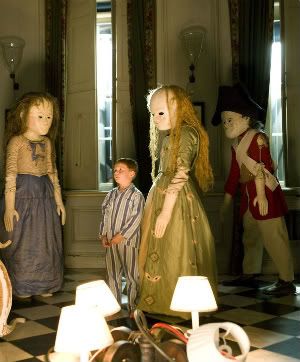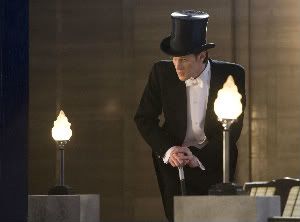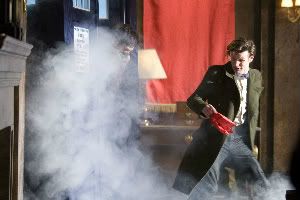Doctor Who: The Girl Who Waited

Doctor Who: Series Six - The Girl Who Waited
Written by Tom MacRae
Directed by Nick Hurran
Broadcast on BBC1 - 10th September 2011
Red or Black? In the hands of the right production team, 'Red or green?' proves to be an infinitely more dramatic question...
As a kindness, the use of two words has been minimised in what follows. I promise that there will be precious few mentions of 'timey' and 'wimey'. Because, of course, this episode covers richly Moffat-esque ground, as time paradoxes and “wubbly” foldings of the then and the now eventually create a dreadful dilemma for Rory Williams. However, writer Tom MacRae finds his own way to grasp the showrunner's favoured themes, and as a result this rendering of Amy Pond feels more emotionally real than perhaps ever before in her time on the show. Karen Gillan is a fine actress, but Amy-as-written has sometimes seemed like a collection of tics, betrayed by tendencies to go for the funny line or the plot arc rather than character consistency and depth psychology. As a result, it's not always been easy to relate to Amy as if she's a flesh-and-blood, real person (notwithstanding the fact that she hasn't always been a flesh-and-blood, real person in series six). Poor Amelia spent her childhood waiting for the Doctor, challenging everybody around her and holding on to the reality of her raggedy man, but we've rarely seen the psychological results of that struggle in the show. Not really.
But, oh, The Girl Who Waited makes good on the promise of Moffat's set-up for Amy Pond. This time we finally get a sense of how waiting for the Doctor might corrode a person's spirit, with Older Amy having become embittered, hard and unfeeling, donning an emotional carapace as well as a cobbled-together, protective costume. MacRae doesn't pull any punches, and his script is all the more intense and dramatically satisfying as a result, whether it's Future Amy confessing her hatred for the Doctor, seeming not to care if Rory gets himself killed, or mocking the Time Lord's “voice of God”.
Ostensibly a Doctor-lite episode thanks to virulent Chen7, MacRae gets around this in a series of ways. Not just via Rory-cam, but also by transforming Future Amy into a version of the Doctor – she's not quite emotionally wired up, she's in possession of her own lashed-up sonic screwdriver, and she's well up to speed on her environment, having cleverly figured out ways of fooling the Handbots. But Rory is also forced to become Doctor-ish: “You're turning me into you”, he realises too late as the Doctor compels him to choose between his wives. Narrative actions we'd expect the Doctor to perform are thus neatly handed over, in differing ways, to Old Amy and Rory – the Companions Who Can.
This episode is also notably guest-star-lite, which presumably pleased those in charge of the show's purse strings. Amy-heavy instead, it gives Gillan a chance to explore her character's darker side, as well as further fleshing out Amy and Rory's love. There's more 'emotional realism' on show here than has been evident for quite some time in the worlds of Doctor Who; compare this episode's character psychology to River Song's in Let's Kill Hitler, for example. Where River's change of heart – from psychopathic assassin to repentant love in 32 or so minutes – never quite felt convincing, this story rarely puts a foot (or a hand) wrong in its explorations of self-sacrifice, love and hate. Plot mechanics have sometimes all-too-visibly driven character emotions elsewhere, but here characters' feelings are seamlessly integrated into events. Good work, Tom MacRae. Despite promoting a piece of Moffat's previous dialogue into the episode title, this has the feeling of a script that Russell T. Davies would have been more than happy commissioning. It even has monsters with a catchphrase, hooray!
But if MacRae plays a blinder, then so too do the likes of Michael Pickwoad and Nick Hurran, handily reunited as a designer-director pairing after their work on the AMC/ITV remake of The Prisoner. Pickwoad transforms what could have been prosaic sci-fi – all labels and buttons for 'Arrivals' or 'Departures' – into a stark, blank minimalism intensifying the horror of Amy's life spent among such nothingness. (Again, this probably pleased those in charge of budgeting). It's a pity, however, that tension between production design and story logic makes Amy seem rather daft in the pre-credits sequence. From a design point of view, Green Anchor and Red Waterfall needed to be clearly distinct so that the audience would quickly pick up what's going on. But from a story perspective, for Amy to pick one of the two buttons haphazardly really calls for them to be fairly indistinguishable so as to sell this moment, and her mistake. Design triumphs over plot, however, making Amy's choice to press red to get into a room – without so much as querying which of the buttons she ought to select – look more than a touch implausible. This is a rare mishandling, though, as Hurran otherwise makes a series of great choices. Old Amy's final attack on the Handbots, all sparking slo-mo, is itself pretty stunning, but even that's immediately topped by the directorial and editing decision to mix together shots of Future Amy (far left of frame) and Rory (far right). In an episode where two timestreams interact, and where two Amys have been paradoxically brought together, this climactic sequence almost heartbreakingly brings together two different spaces on-screen. Inside and outside the TARDIS are almost made to touch; two impossible spaces folded together at the end of a tale of two temporalities. It's a thematically spot-on choice, and it allows both Gillan and Darvill to shine.
Hurrah for Hurran; bring him back soon, please. Oh, right, he's directing next week's ep. I'm strongly tempted to view this as a budget-saver episode, promoted from over-commission on grounds of fiscal prudence. But whether or not it's Discount Who, it is nonetheless a TV drama treat, as affecting as it is well-designed, sensitively directed, and sharply acted. Beyond 'timey' and 'wimey' gimmicks, hand-on-heart, this is totally and wonderfully Doctor Who.
Matt Hills is the author of Triumph of a Time Lord, and is currently reviewing Torchwood: Miracle Day for the Antenna blog.





 As usual with Doctor Who, it is so easy to be taken along for the ride from beginning to end, and the cracks in the plot are easily plastered up by the sheer pace and display put on. One crack in particular that stuck out for me was quite how Mels ended up where she was. We see the young Melody regenerate into her at the end of Day of the Moon ... but this was in 1969(ish) and River says she only changed this once, so how did a young black girl get from New York City to Leadworth, not to mention being "born" at least couple of decades before her parents? Time Lords (should we call her that?) may age differently from humans, but then she seemed to match up with them rather well. Mind you, this could be a previously unknown facet of Time Lord physiology that they can control how they age (possibly borne out by an aside by River on getting younger tonight?).
As usual with Doctor Who, it is so easy to be taken along for the ride from beginning to end, and the cracks in the plot are easily plastered up by the sheer pace and display put on. One crack in particular that stuck out for me was quite how Mels ended up where she was. We see the young Melody regenerate into her at the end of Day of the Moon ... but this was in 1969(ish) and River says she only changed this once, so how did a young black girl get from New York City to Leadworth, not to mention being "born" at least couple of decades before her parents? Time Lords (should we call her that?) may age differently from humans, but then she seemed to match up with them rather well. Mind you, this could be a previously unknown facet of Time Lord physiology that they can control how they age (possibly borne out by an aside by River on getting younger tonight?).






